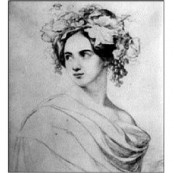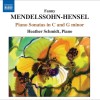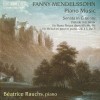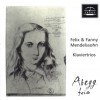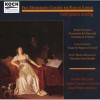Composers
Fanny Mendelssohn (14 November 1805 – 14 May 1847), later Fanny [Cäcilie] Mendelssohn Bartholdy and, after her marriage, Fanny Hensel, was a German pianist and composer, the sister of the composer Felix Mendelssohn and granddaughter of the philosopher Moses Mendelssohn. She was the grandmother of the philosopher Paul Hensel and the mathematician Kurt Hensel.
Fanny Mendelssohn was born in Hamburg, the oldest of four children. She was descended on both sides from distinguished Jewish families; her parents were Abraham Mendelssohn (who was the son of philosopher Moses Mendelssohn and later changed the family surname to Mendelssohn Bartholdy), and Lea, née Salomon, a granddaughter of the entrepreneur Daniel Itzig. She was not however brought up as Jewish, and never practised Judaism, though it has been suggested that she "retained the cultural values of liberal Judaism".[1]
Fanny shared the early musical education and upbringing of her younger brother Felix, including tuition from Carl Friedrich Zelter and others.[2] Zelter indeed at one point favoured Fanny over Felix: he wrote to Goethe in 1816, in a letter introducing Abraham Mendelssohn to the poet, 'He has adorable children and his oldest daughter could give you something of Sebastian Bach. This child is really something special'.[3]
The siblings shared a great passion for music. Like Felix (who was born in 1809), Fanny showed prodigious musical ability as a child and began to write music. Visitors to the Mendelssohn household in the early 1820s, including Ignaz Moscheles and Sir George Smart, were equally impressed by both siblings. She may also have been influenced by the role-models of her great-aunts Fanny von Arnstein and Sarah Levy, both lovers of music, the former the patroness of a well-known salon and the latter a skilled keyboard player in her own right.[4]
However, Fanny was limited by prevailing attitudes of the time toward women, attitudes apparently shared by her father, who was tolerant, rather than supportive, of her activities as a composer. Her father wrote to her in 1820 "Music will perhaps become his [i.e. Felix's] profession, while for you it can and must be only an ornament".[5] Although Felix was privately broadly supportive of her as a composer and a performer, he was cautious (professedly for family reasons) of her publishing her works under her own name. He wrote:
'From my knowledge of Fanny I should say that she has neither inclination nor vocation for authorship. She is too much all that a woman ought to be for this. She regulates her house, and neither thinks of the public nor of the musical world, nor even of music at all, until her first duties are fulfilled. Publishing would only disturb her in these, and I cannot say that I approve of it'.[6]
Felix did however arrange with her for some of her songs to be published under his name,[7] three in his Op. 8 collection,[8] and three more in his Op. 9.[9] In 1842[8] this resulted in an embarrassing moment when Queen Victoria, receiving Felix at Buckingham Palace, expressed her intention of singing the composer her favourite of his songs,[7] "Italien", which Mendelssohn confessed was by Fanny.[8]
In turn Fanny helped Felix by constructive criticism of pieces and projects, which he always considered very carefully. Their correspondence of 1840/41 reveals that they were both outlining scenarios for an opera on the subject of the Nibelungenlied: Fanny wrote 'The hunt with Siegfried's death provides a splendid finale to the second act'.[10]
In 1829, after a courtship of several years, Fanny married the painter Wilhelm Hensel and the following year she had her only child, Sebastian Ludwig Felix Hensel.[11]
Her husband was supportive of her composing. Subsequently, her works were often played alongside her brother's at the family home in Berlin in a Sunday concert series (Sonntagskonzerte), which was originally organized by Fanny's father, and after 1831 carried on by Fanny herself. Her public debut at the piano (and only known public performance) came in 1838, when she played her brother's Piano Concerto No. 1. In 1846, she decided, without consulting Felix, to publish a collection of her songs (as her op. 1).[12]
Fanny Hensel died in Berlin in 1847 of complications from a stroke suffered while rehearsing one of her brother's oratorios, The First Walpurgis Night. Felix himself died less than six months later from the same cause (which was also responsible for the deaths of both of their parents and of their grandfather Moses),[13] but not before completing his String Quartet No. 6 in F minor, written in memory of his sister.
In recent years, her music has become better known thanks to concert performances and a number of CDs being released on labels such as Hyperion and CPO. Her reputation has also been advanced by those researching female musical creativity, of which she is one of the relatively few well-documented exemplars in the early 19th century.
Recently Added
| Country: | Germany |
| Period: | Romantique |
Biography
Fanny Mendelssohn (14 November 1805 – 14 May 1847), later Fanny [Cäcilie] Mendelssohn Bartholdy and, after her marriage, Fanny Hensel, was a German pianist and composer, the sister of the composer Felix Mendelssohn and granddaughter of the philosopher Moses Mendelssohn. She was the grandmother of the philosopher Paul Hensel and the mathematician Kurt Hensel.
Fanny Mendelssohn was born in Hamburg, the oldest of four children. She was descended on both sides from distinguished Jewish families; her parents were Abraham Mendelssohn (who was the son of philosopher Moses Mendelssohn and later changed the family surname to Mendelssohn Bartholdy), and Lea, née Salomon, a granddaughter of the entrepreneur Daniel Itzig. She was not however brought up as Jewish, and never practised Judaism, though it has been suggested that she "retained the cultural values of liberal Judaism".[1]
Fanny shared the early musical education and upbringing of her younger brother Felix, including tuition from Carl Friedrich Zelter and others.[2] Zelter indeed at one point favoured Fanny over Felix: he wrote to Goethe in 1816, in a letter introducing Abraham Mendelssohn to the poet, 'He has adorable children and his oldest daughter could give you something of Sebastian Bach. This child is really something special'.[3]
The siblings shared a great passion for music. Like Felix (who was born in 1809), Fanny showed prodigious musical ability as a child and began to write music. Visitors to the Mendelssohn household in the early 1820s, including Ignaz Moscheles and Sir George Smart, were equally impressed by both siblings. She may also have been influenced by the role-models of her great-aunts Fanny von Arnstein and Sarah Levy, both lovers of music, the former the patroness of a well-known salon and the latter a skilled keyboard player in her own right.[4]
However, Fanny was limited by prevailing attitudes of the time toward women, attitudes apparently shared by her father, who was tolerant, rather than supportive, of her activities as a composer. Her father wrote to her in 1820 "Music will perhaps become his [i.e. Felix's] profession, while for you it can and must be only an ornament".[5] Although Felix was privately broadly supportive of her as a composer and a performer, he was cautious (professedly for family reasons) of her publishing her works under her own name. He wrote:
'From my knowledge of Fanny I should say that she has neither inclination nor vocation for authorship. She is too much all that a woman ought to be for this. She regulates her house, and neither thinks of the public nor of the musical world, nor even of music at all, until her first duties are fulfilled. Publishing would only disturb her in these, and I cannot say that I approve of it'.[6]
Felix did however arrange with her for some of her songs to be published under his name,[7] three in his Op. 8 collection,[8] and three more in his Op. 9.[9] In 1842[8] this resulted in an embarrassing moment when Queen Victoria, receiving Felix at Buckingham Palace, expressed her intention of singing the composer her favourite of his songs,[7] "Italien", which Mendelssohn confessed was by Fanny.[8]
In turn Fanny helped Felix by constructive criticism of pieces and projects, which he always considered very carefully. Their correspondence of 1840/41 reveals that they were both outlining scenarios for an opera on the subject of the Nibelungenlied: Fanny wrote 'The hunt with Siegfried's death provides a splendid finale to the second act'.[10]
In 1829, after a courtship of several years, Fanny married the painter Wilhelm Hensel and the following year she had her only child, Sebastian Ludwig Felix Hensel.[11]
Her husband was supportive of her composing. Subsequently, her works were often played alongside her brother's at the family home in Berlin in a Sunday concert series (Sonntagskonzerte), which was originally organized by Fanny's father, and after 1831 carried on by Fanny herself. Her public debut at the piano (and only known public performance) came in 1838, when she played her brother's Piano Concerto No. 1. In 1846, she decided, without consulting Felix, to publish a collection of her songs (as her op. 1).[12]
Fanny Hensel died in Berlin in 1847 of complications from a stroke suffered while rehearsing one of her brother's oratorios, The First Walpurgis Night. Felix himself died less than six months later from the same cause (which was also responsible for the deaths of both of their parents and of their grandfather Moses),[13] but not before completing his String Quartet No. 6 in F minor, written in memory of his sister.
In recent years, her music has become better known thanks to concert performances and a number of CDs being released on labels such as Hyperion and CPO. Her reputation has also been advanced by those researching female musical creativity, of which she is one of the relatively few well-documented exemplars in the early 19th century.
